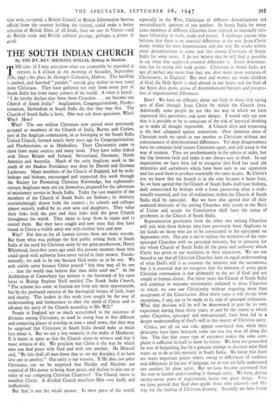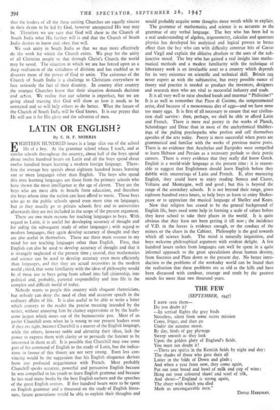THE SOUTH INDIAN CHURCH
By THE RT. REV. MICHAEL HOLLIS, Bishop in Madras
THE time (if I may anticipate what can reasonably be regarded as certain) is 8 o'clock in the morning of Saturday, September 27th, 5947 ; the place St. George's Cathedral, Madras. The building is packed, and thatched " pandals " outside give shelter to over 2,000 more Christians. They have gathered not only from every part of South India but from many corners of the world. A voice is heard: " I do hereby declare that these three Churches . . . are become one Church of South India." Anglicanism, Congregationalism, Presby- terianism, Methodism in South India die that they may live. The Church of South India is born. One may ask three questions. Who? Why? How?
Who? The one million Christians now united were previously grouped as members of the Church of India, Burma and Ceylon, part of the Anglican communion, or as belonging to the South India United Church, formed nearly forty years ago by Congregationalists and Presbyterians, or as Methodists. Their Christianity came to them from many sources and many lands. They have today linked with Great Britain and Ireland, Switzerland, Germany, North America and Australia. Much of the early Anglican work in the south of the Madras Presidency was done by Danish and German Lutherans. Many members of the Church of England, led by arch- bishops and bishops, encouraged and supported this work through the Society for Promoting Christian Knowledge, but eighteenth- century Anglicans were not yet themselves prepared for the adventure of missionary service in South India. Today the vast majority of the members of the Church of South India are Indians ; its ministry overwhelmingly drawn from the country ; its schools and colleges almost entirely staffed by its own sons and daughters. They value 'their links with the past and their links with the great Church throughout the world. They mean to keep them in repair and to extend them. But they have sought and now trust that they have found in Christ a visible unity one with another here and now.
Why? For this as for all human actions there are many reasons. But from what was perhaps the first public setting forth in South India of the need for Christian unity by my great predecessor, Henry Whitehead, forty-five years ago until this present moment those who could speak with authority have never varied in their answer. Funda- mentally, we seek to be one because God wants us to be one. We seek visible unity because Christ prayed " that they may all be one . . . that the world may believe that thou didst send me." As the Archbishop of Canterbury has written in the foreword of his open letter to Bishop Stephen Neil entitled The South India Church, " The scheme has come to fruition not from any mere opportunism, but by the profound exercise of the theological virtues of faith, hope and charity. The leaders in this work have sought by the way of understanding and forbearance to obey the mind of Christ and to advance the unity of the Church according to His Will."
People in England are so much accustomed to the existence of divisions among Christians, so used to seeing four or five different and competing places of worship in even a small town, that they may be surprised that Christians in South India should make so much fuss about it. But we are a tiny minority in the midst of Hinduism. It is burnt in upon us that the Church exists to witness and that it must witness die. We proclaim that Christ is the way by which men can find peace with God and with one another. He Himself said, "By this shall all men know that ye are my disciples, if ye have love one to another." Our unity is our witness. If He does not unite Christians, can we be surprised that Hindus and Muslims are sceptical of His power to bring them peace, and decline to join one or other of our competing Christian Churches? The Church exists to manifest Christ. A divided Church manifests Him very badly and ineffectively.
But that is not the whole answer. In most parts of the world, especially in the West, Christians of different denominations are extraordinarily ignorant of one another. In South India for many years members of different Churches have enjoyed an unusually inti. mate fellowship in work, study and prayer. I challenge anyone who believes that there is an essential difference in the way Jesus Christ works within his own denomination and „the way He works within other denominations to come and live among Christians of South India for some years. I do not believe that he will find it possible to say what that supposed essential difference is. Every denomina- tion has its strong and weak points. Christians in South India are not all perfect any more than they are, after many more centuries of Christianity, in England. But men and women are made children of God, the Holy Spirit is shed abroad in our hearts and the fruit of the Spirit does grow, across all denominational barriers and irrespec- tive of organisational differences.
How? We have no difficulty about our faith in those vital saving acts of God through Jesus Christ by which the Church lives. Admittedly some people do not like the way in which we have expressed this agreement, and scent danger. I would only say now that it is possible to be so conscious of the risk of heretical thinking as to make all thought impossible. A Church alive and witnessing is the best safeguard against syncretism. Over immense areas of Christian truth we speak to one another as Christians without any consciousness of denominational differences. Yet deep disagreements have for centuries held sincere Christians apart, and still stand in the way of reunion. They are predominantly in the sphere of order, but the line between faith and order is not always easy to draw. In our negotiations we have been led to recognise that God has used the ministries and sacraments which have been ours in our separation and has used them to produce essentially the same results. By Christ's test we know that the branch is in the vine because it bears fruit. So we have agreed that the Church of South India shall have bishops, duly consecrated by bishops with a form preserving what is tradi- tionally essential, and that all ordinations within the Church of South India shall be episcopal. But we have also agreed that all duly ordained ministers of the uniting Churches who assent to the Basis of Union and accept the Constitution shall have the status of presbyters in the Church of South India.
Representative presbyters from the other two uniting Churches will join with three bishops who have previously been Anglicans to lay hands on those who are to be consecrated to the episcopate on September 27th. Our aim is not to replace the ministries of the non- episcopal Churches with an episcopal ministry, but to preserve for the whole Church of South India all the grace and authority which Christ has given to our ministries in their separation. We are not bound to say that all Christian Churches have an equal understanding of what God's will is as concerns the ministry and the sacraments, but it is essential that we recognise that the ministry of every great Christian communion is due ultimately to the act of God and not simply to human choice. For thirty years the Church of South India will continue to welcome missionaries ordained in those Churches to which we owe our Christianity without requiring more than acceptance of the Constitution. After thirty years it will decide what exceptions, if any, are to be made to its rule of episcopal ordination. What that decision will be will be determined in part by its own experience during these thirty years, in part by the extent to which other Churches, episcopal and non-episcopal, have been led to a deeper understanding of God's will in this matter of Christian unity.
Critics, not all on one side, appear convinced that, while their principles have been betrayed, some one else has won all along the line. The fact that every type of extremist makes the same com- plaint is sufficient in itself to show its falsity. We have not proceeded by way of bargaining, but by a genuine attempt to discover what God wants us to do at this moment in South India. We know that there are many important points where, owing to differences of tradition and differences in the use of language, we do not yet fully understand one another, let alone agree. But we have become convinced that the way to further understanding is through unity. We have, during twenty-seven years of negotiations, learnt two great things. First we have proved that God does guide those who sincerely seek His way for the healing of Christian disunity. Secondly we have learnt that the leaders of all the three uniting Churches are equally sincere in their desire to be led by God, however unexpected His way may be. Therefore we are sure that God will show to the Church of South India what His further will is and that the Church of South India desires to know and obey that will.
We seek unity in South India so that we may more effectively do the work for which the Church exists. We pray for the unity of all Christian people so that through Christ's Church the world may be saved. The situation in which we are has forced upon us a deep realisation of the sinfulness of division and has enabled us to discover more of the power of God to unite. The existence of the Church of South India is a challenge to Christians everywhere to face seriously the fact of their disunity. In country after country the younger Churches know that their situation demands decision and action. We realise that our scheme is imperfect, but we are going ahead trusting that God will show us how it needs to be corrected and so will help others to do better. What the future of the Church of South India will be God knows. It is our prayer that He will use it for His glory and the salvation of men.



































 Previous page
Previous page